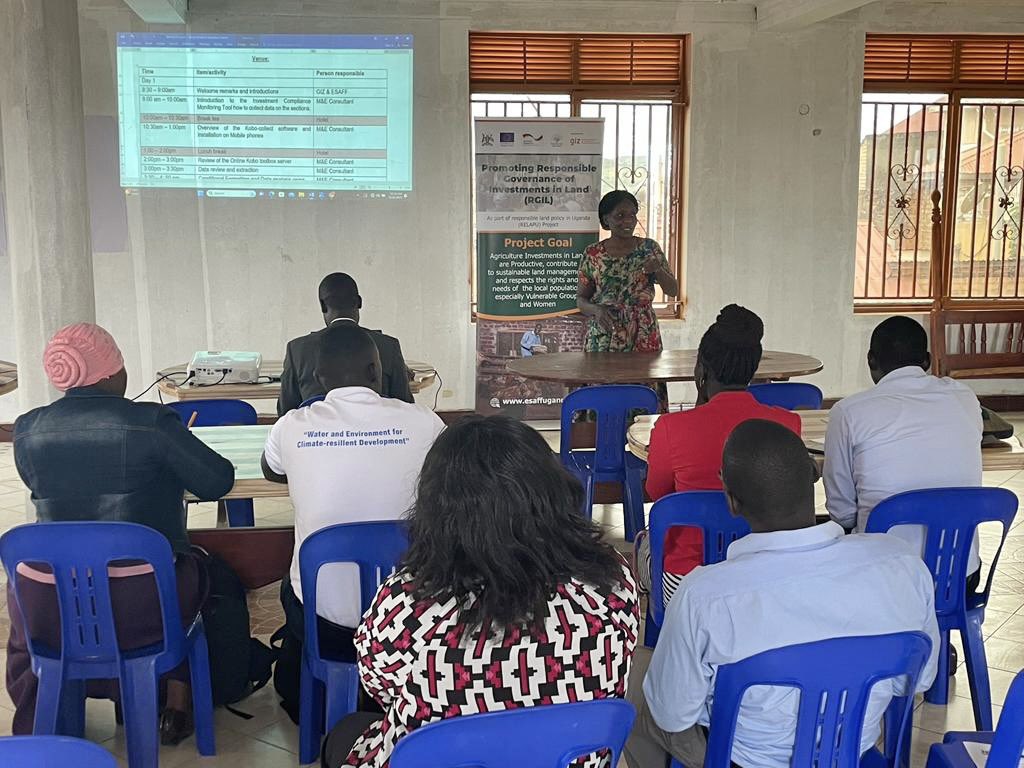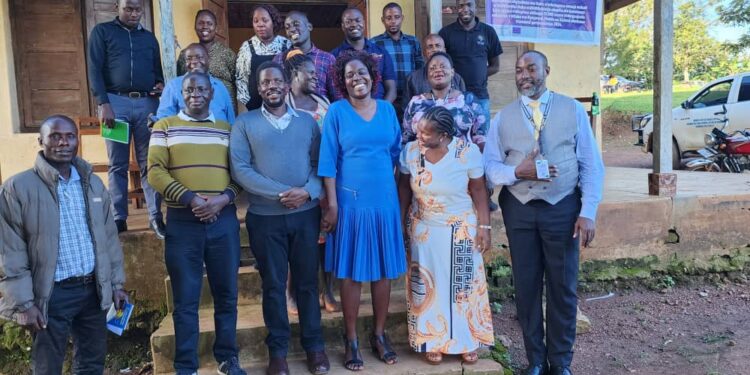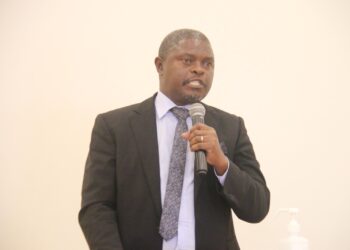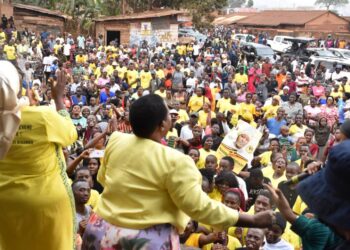The Uganda Investment Authority (UIA), Eastern and Southern Africa Small Scale Farmers Forum (ESAFF Uganda), along with GIZ, are advocating for a collaborative approach to foster economic growth.
These organizations are dedicated to realizing this goal in Uganda by establishing conducive conditions for the formation of Local Economic Development and Investment Committees (LEDICs).
Taking the lead in spearheading this initiative is Peter Muramira, the Deputy Director of Business Development at Uganda Investment Authority. He underlined the critical intersection between local economic development and district-level investments.
Addressing leaders of Gomba District Local Government (DLG) on October 25th at Nakyegonza Subcounty headquarters in Gomba, Muramira emphasized the significance of LEDICs in driving progress towards strategic investments.
He emphasized a shared aspiration: promoting local economic development and job creation, ultimately working towards industrializing the country. Muramira affirmed, “We all want to achieve one thing: local economic development and job creation. We want to industrialize our country.”
Representing Kirumira Daniel, the head of the project component dedicated to advancing Responsible Governance of Investment in Land (RGIL) for GIZ, Gladys Nakasi asserted that the absence of secure land tenure hampers strategic investments.
“The absence of secure land tenure jeopardizes the livelihoods of the rural populace. Without a stable land tenure, one cannot truly thrive,” emphasized Gladys.
It is worth noting that the lack of secure land tenure presents a substantial obstacle to the economic, social, and environmental well-being of rural communities, hence hindering viable investments.
This is because it hampers the ability for citizens to make informed decisions about their land, obstructs avenues for economic progress, and can perpetuate cycles of poverty and vulnerability. This elucidates the rationale behind the intervention by these entities through the RGIL program, with a major focus on the establishment of LEDICs.
Gladys detailed the program’s multifaceted approach, stating, “At the district, community, and investor levels, we focus on strengthening capacities regarding responsible investments in land, primarily in agriculture.”
She highlighted the support provided for monitoring and evaluating compliance with investments, as well as the facilitation of dispute resolution mechanisms for conflicts arising from land investments.
The RGIL initiative is being implemented by these entities in districts of Kassanda, Mubende, Mityana, Gomba, with direct support from European Union, German Cooperation and USAID.
Of noteworthy mention, RGIL is a crucial component of the broader Responsible Land Policy in Uganda (RELAPU) Project and its implementation is being done under the guidance of Ministry of Lands, Housing and Urban Development, along with UIA.
The Project seeks to ensure that agricultural investments in land are productive, contribute to sustainable land management, and respects the rights and needs of the local population especially vulnerable groups and women.
LEDIC and Its Relevance To Strategic Investments
There are presently two committees focused on advancing Local Economic Development and Investment within Local Governments: the District Investment Committees (DICs) overseen by District Chairpersons, and the District Local Resource Teams (DLRTs) headed by Chief Administrative Officers.
It has been noted that these committees share a similar composition and fulfill comparable functions, potentially leading to conflicts and role ambiguity.
To establish a more robust and efficient local governance framework for the promotion of Local Economic Development and Investment, a new entity known as the Local Economic Development and Investment Committee (LEDIC) has been established.
This committee is set to be activated in Districts, Cities, Municipalities, Town Councils, and other Lower Local Governments.
While addressing Gomba District Local Government Leaders, Ronald Bagaga, the Program Officer for Research and Policy at ESAFF Uganda said the purpose of LEDIC is to build up the economic capacity of a local area, to improve its economic future and the quality of life for all.
“LED is important because it is intended to create a conducive environment for investment, increase household incomes, and generate higher revenues for Local Governments, ultimately translating into improved service delivery and wellbeing of the people,” he said.
In Uganda, he affirmed, LEDIC holds significant relevance due to several key factors. It extends Local Government mandates, calling for territorial growth and oversight. This recognition acknowledges that the national economy is a conglomerate of sub-national (district) and lower-level economies.
Furthermore, there has been a noticeable shrink in Central Government Transfers to Local Governments. This necessitates the need to complement Government efforts for development through mechanisms like LEDICs. These committees play a pivotal role in resource mobilization for non-traditional investments, a view shared by Bagaga.
In addition, LEDICs address the pressing issue of escalating unemployment rates, both in off-farm and on-farm sectors. They work towards increasing and improving household incomes and raising general standards of living for communities.
Moreover, LEDICs contribute to diversifying the local revenue base for Local Governments, allowing them to have a more stable financial footing. This, in turn, enables them to contribute to service delivery through co-financing arrangements and covering operation and maintenance costs.
Important still, the establishment of LEDICs promotes independence and accountability to the constituents. It allows for the efficient allocation of resources and supports various functions such as councilors’ allowances and representation, reinforcing the democratic process at the local level.

District Government Local Leaders’ Perspectives
Morgan Kawalya, the District Community Development Officer (DCDO) for Gomba said that once the committee becomes operational, a multitude of investors will be drawn to Gomba and other districts, leading to similar advancements. This, in turn, will create much-needed growth opportunities for both the state and its citizens.
“The Committee will have the mandate, influence to attract perhaps regulate investors both local and foreign in the district,” he affirmed.
Kizito Martin Luther, the District Planner said that Gomba has an improvement plan, but unfortunately, their local economic development strategy was lacking, something that will be addressed once the committe becomes operational.
Meeme Mariam, a member of the Gomba District Council, echoed Kawalya’s perspective. She emphasized that the committee would play a crucial role in connecting both local and foreign investors with the abundant investment opportunities available in the district.
Advancing Investor Compliance Monitoring in Gomba District
In a pioneering effort, the Investor Compliance Monitoring Tool (ICM Tool), developed through a collaboration between ESAFF Uganda and GIZ, was deployed to evaluate investor adherence to environmental, societal, and state objectives within Gomba District.
Ten officials from diverse departments within Gomba DLG underwent extensive training to proficiently utilize this tool.
These officials conducted meticulous data collection from 25 targeted investments in the district, receiving guidance and logistical support from ESAFF staff members.
The ICM Tool encompasses seven critical sections, addressing aspects from food security and nutrition to promoting gender equality and inclusive governance structures.
The tool’s advanced capabilities promises significant outcomes, including the precise identification and mapping of investments in Gomba District, coupled with detailed documentation of their contributions to growth and development.
Additionally, it ensures strict compliance with local laws and policies, shedding light on areas of knowledge gaps, challenges faced by investors, and their financial contributions.
Furthermore, the ICM Tool plays a pivotal role in championing human rights and workers’ rights, and it streamlined the establishment of effective grievance handling mechanisms in workplaces.
ESAFF Uganda also provided a fully equipped computer system to Gomba District Local Government to assist in the effective implementation and operationalization of these technology centered initiatives.
The formation and functioning of LEDICs in Uganda serve as a crucial mechanism for driving sustainable economic development and improving the overall welfare of its citizens.
Do you have a story in your community or an opinion to share with us: Email us at editorial@watchdoguganda.com













